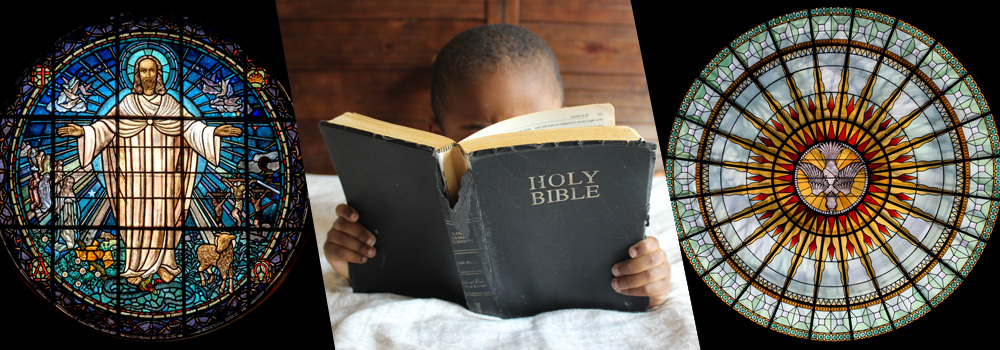By Jesse Fungwa Kipimo
Introduction
Commenting in the special edition of Conspectus as editors, on the impact pentecostalisation is making in Africa, Smith and Manyika (2018: 1) agree that “Pentecostalism (including Charismatics and Neo-Pentecostal forms) has become the dominant expression of Christianity in Africa. In other words, the Christian faith in Africa wears the Pentecostal- Charismatic garb”. This remarkable growth of the movement does not only shape people’s spirituality but also affects their understanding of God’s word and their theological reflection. Some scholars, especially those from non- Pentecostal traditions tend to have a negative view towards the spiritual type of churches when it comes to how they interpret Scripture and understand theology. This paper tries to examine the Pentecostal church’s view of Scripture and how this shapes their understanding of the Triune God.
There is need to mention here that what we believe about God will affect how relate to God. How Pentecostals view Scripture and what they teach directly affect their rapport with God. I contend that this reflection is important in two ways: first, it provides an opportunity to assess how Pentecostals in Africa relate to Scripture through their hermeneutical lenses. Second, this academic exercise will help in refuting any misconceptions around Pentecostals and the doctrine of the trinity. I propose to develop this essay around four axes, namely (1) Pentecostals as people of the book, (2) Pentecostals as children of God, (3) Pentecostals as worshippers of Christ, (4) Pentecostals as the people of the Spirit.
1. Pentecostals as people of the book
In order to understand Pentecostals’ theology of the triune God, one should first examine the Pentecostal view of Scripture. How they relate to Scripture and the value they place on the Bible have some implications on their theologies. The Pentecostal way of understanding Scripture affects their doctrines and spirituality. Arrington (1988:378) affirms that doctrines are necessarily an outgrowth of biblical interpretation. In this section, as I reflect on the issue of Pentecostal hermeneutics and theology, I will focus on key features of Pentecostal hermeneutics.
A number of Pentecostal scholars argue that, in order to understand Pentecostal hermeneutics (the way in which Pentecostals typically interpret the Bible) one has to identify the features of early Pentecostal hermeneutics. Archer (2001:33-41) observes three aspects of early Pentecostal hermeneutics: its literal, ahistorical and pietistic nature.
To start with, early Pentecostals are known to have been using an unbending literalism in biblical interpretation, since they view Scripture as the authoritative word of God. Archer points out that, when it comes to biblical interpretation, Pentecostals focus on the literal meaning of Scripture. Pentecostal biblical readings are not attempting to produce a systematic theology or exegetical commentaries; they are much more concerned with living the Christian life and defending the apostolic faith. Hence, they focus on the literal meaning of the Word of God. In their literal approach, Archer (2001:36) reports that Pentecostals serve specific ecclesiastical functions, missionary outreach and community renewal in that they aim at producing an enhanced faith, hope and love for both individuals and the community.
Early Pentecostal hermeneutics was also ahistorical. Walker (1984:365) points out that this ahistorical feature meant that the Bible had somehow escaped the particularity of a specific historical context: The authors of the Bible were not influenced in any truly significant way by the setting in which they lived. This view is further explained by Saayman (1993:52):
For Pentecostals the word of God is an objective reality out there, existing without cultural, social or historical relations. Social, cultural and linguistic differences will therefore make no difference to the meaning of the Bible. This explains the trend among Pentecostal preachers, especially in Lubumbashi in the Congo, to overlook the historical context of a biblical passage and strive to apply it directly to the present context.
Sheppard (1984:22) is of the view that this ahistorical aspect of the Pentecostal way of interpreting the Bible is clearly seen in the way they apply the message. When they interpret a biblical passage, they do so in order to apply it directly to their immediate context. Unlike classical Protestants who read the Bible as past inspired revelatory document, Pentecostals read the Bible as a presently inspired Word, having no strings attached to historical or cultural contexts. The third feature of the early Pentecostalism is what Donald (1987:23) calls “subjectivising hermeneutics.” This is an emphasis on the present religious experience of the preacher and the congregation. The internal religious experience was the necessary subjective counterpart to external objective text. Pentecostals, like Pietists, valued “subjective” religious experience, which sometimes exposed them to faulty interpretations of Scripture. For Pentecostals, the starting point for understanding Scripture is the personal experience of God. They embrace religious experiences as a necessary component of their interpretive strategy. From a historical perspective, Pentecostal hermeneutics present three features that, from my view, are not only historically true of Pentecostals, but are also contemporary features of how Pentecostals interpret and preach Scripture as God’s Word. In most of the preaching I witnessed and heard in different congregations in the city where I live, all the aspects discussed above are evident. In most cases, the context of the biblical passage is overlooked, and the experiences of the preacher have almost become the starting point to interpreting the Bible.
From this brief hermeneutical overview, it is evident that Pentecostals have a strong belief in God’s word, and that they do not allow anything or anyone to oppose or contradict what the Bible says. Despite some possible dangers in the way they handle Scripture, their hermeneutics has served them well in growing the movement on the African continent.
In the next section, I will examine the Pentecostals’ theology of the Ttriune God. That is how they view each person of the trinity and the relationship they establish with these three divine persons in their Christian walk. Since Pentecostal theology in Africa is generally oral theology, one of the ways to grasp their understanding of the trinity is to analyse the songs which they sing with regard the three persons of the Godhead. Recently, I analysed some Pentecostals songs in the city of Lubumbashi, and I would like to share some of my findings with regard to Pentecostal theology of the trinity.
2. Pentecostals as children of God
Kipimo (2014) points out that Pentecostals in Africa have a high view of God’s Fatherhood. The African context of hardship, economic uncertainty and political instability has led most African Pentecostals to look to their heavenly father. Church members are encouraged to put their trust in God the Father who cares for them and provides to their various needs. As a Father, God also understands when his children are in trouble and call on his name. He dwells among those who are his, in order to keep watch over them. There is no person who can compare to the fatherhood of God. The fatherhood of God is one of the most sung and preached themes among Pentecostals in Africa, Congo in particular. As a Father, God is considered the source of power and strength for his people. They confess that during their times of trial and hardship God remains their only hiding place:
Na kila siku ya jaribu natakiwa nguvu naye Baba (Kiswahili)
I will run to my father and receive strength from him whenever in trouble (Song 78).
People are encouraged not to waste their time and efforts in looking for temporal pleasures. They should rather seek their heavenly father and will then get whatever they need for life. As a Father, God knows whatever his children go through; because of his heart of compassion and love, He will never forget them:
Haifai ku yasumbukai Mambo yatakayo kuwa kesho. Baba yangu ana juwa yote. Yeye mwenye moyo wa upendo ana nipa yafaayo kweli (Kiswahili).
Do not worry about tomorrow. My father knows all things.
He is a loving father and he gives me what I really need (Song 46).
3. Pentecostals as worshippers of Christ Jesus
Kipimo (2014) observes that the person and the work of our Lord Jesus Christ occupies an important space in Pentecostal preaching and worship in Africa. Christ is the saviour, the healer and the helper as well as the soon-coming King. Members of the Spiritual type of churches make more reference to Jesus than God the Father in their singing, sermons and prayers. They make more reference to Christ in their prayers, sermons and songs because He is the one who came to reveal the Father whom they never knew. They regard it as appropriate since Jesus Christ is the full reflection of God the Father. Pentecostal members rejoice because Christ came to seek the lost and they got saved.
This theme is clearly expressed in Song 12:
Yesu alinikomboa, lakini si kwa zahabu na mali ya dunia; bali damu ya Mwokozi ni malipo kwa ajili yangu (Kiswahili).
Jesus saved me, not with precious stones of this world but with his precious blood. This blood was shed because of me.
Christ is not only viewed as the saviour among Pentecostals, but he is also their healer. They normally establish a link between sickness or physical illness and sins. They argue that if Christ’s death took away our sins, therefore, it also brought healing to the physical illness which came as the result of sins. Hence, the continuous citation of the book Isaiah:
“Surely, our grief he himself bore, and our sorrows he carried; yet we ourselves esteemed stricken, smitten of God, and afflicted. But he was pierced through for our transgressions he was crushed for our iniquities, the chastening for our well being fell upon him and by his scourging we are healed (Isaiah 53:4-5 KJV)”. Apart from the fact that Christ heals, he is also known as a helper:
Sasa Yesu amekuwa Kimbilio langu. Ni we mwaminifu kwake siku zote.
Unabadilisha moyo na kuleta salama nyumbani (Kiswahili).
Now Jesus is our only refuge, he is faithful at all times, he changes the heart and brings peace in homes (Song 35).
4. Pentecostals as the people of the Spirit
Pentecostalism is a movement known for its spirituality (Brandt 1986:19), so one cannot talk of Pentecostalism without referring again and again to the question of the spiritual experience with features such as prayers, Spirit baptism, the exercise of spiritual charismata, corporate praise and worship services and many more. Brandt (1986:20) observes that this emphasis on spirituality explains why Pentecostals are often referred to as the people of spiritual experience. The spiritual experience of Pentecostals is also alluded to by Anderson (2004:302) when he says, “our Pentecostal and charismatic spirituality has to be totally dependent on the Spirit of God. The Spirit is the one who makes us, equips us and who actively participates in our spiritual development.”
The above citation from Anderson (2004) summarizes how Pentecostals understand and relate to the third person of the trinity. He is their maker or creator – he is God, he is the one who empowers them for ministry and life – he is their source of power, he is the one who ensures that Christians continue to develop or grow in their spiritual lives. Their Christian growth and life depend on the Holy Spirit.
Summary
This brief reflection focused on the Pentecostal understanding of the triune God. It has been clearly shown that the Spiritual type of churches in Africa, Democratic Republic of Congo in particular, have a high consideration of Scripture which they take in most cases literally as God’s word. Whatever it teaches is worth of belief or faith. All the three persons of the trinity occupy a central stage in Pentecostal singing, sermons and prayers. Therefore, Pentecostals in Africa can be referred to as the people of the book – the Bible, the children of God, the worshipers of Christ and the people of the Spirit. Since the future of the Christian church has been projected in the Global South, Africa included, we should be confident that doctrinal heresies will not be avoided in the movement but more than eighty five percent of the Pentecostal and charismatic churches continue to hold firmly to their evangelical roots – putting the Bible at the centre of all they do. Of course, with the new development in theological education among Spiritual type of churches – the future is bright.
Works cited list
ARCHER K J 2001. Early Pentecostal Biblical Interpretation. Journal of Pentecostal Theology 18 (No 68): pages.
ANDERSON A 2004. An Introduction to Pentecostalism. Cambridge: Cambridge: University Press.
ARRINGTON FL 1988. Historical perspectives on Pentecostalism and Charismatic hermeneutics. In Stanley, M. Burgess and Gary B, McGee (eds.) Dictionary of the Pentecostal and charismatic movement. Grand Rapids: Zondervan.
BRANDT D B 1986. Aux sources de la spiritualité pentecôtiste. Geneve: Editions Labor et
Bat M & Kevin SG 2018. Editorial: Pentecostalisation and Faith in the Global South. Conspectus, special edition pages 1-4. SATS: Johannesburg
DAYTON D 1987. Theological roots of Pentecostalism. Peabody, MA: Hendrickson. Fides.
KIPIMO FJ 2014. Studying Pentecostalism missiologically: The Congo Evangelistic Missions in Katanga province. DTh Thesis, Unisa: Pretoria
SHEPPARD G 1984. Pentecostals and the hermeneutics of dispensationalism. Pneuma 16.2 (no 22): 5-33.
SAAYMAN W 1993. Some reflections on the development of the Pentecostal mission model in South Africa. Missionalia, 21(1): 52-55.
WALKER G 1984. Functions of faith in primitive Pentecostalism. Harvard Theological Review (No 77): 353-375.
Bio: Jesse obtained his D.Th. from the UNISA. He is currently heading and lecturing at Central African School of Missiology in Lubumbashi, DRC and is the dean in charge of academic affairs at Exousia School of Theology and Ministry in Zambia. Jesse has published three books.




